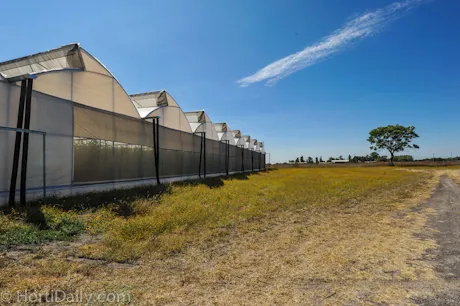
The greenhouse of Soluciones en Horticultura near the town of Celaya in the Mexican state Guanjuato
New greenhouse
A few years ago, Guadalupe Salinas decided to build a new 1.1 hectare medium tech greenhouse to cultivate grape tomatoes. After growing in an older structure for many years, the Salinas family wanted to bring their production to the next level and built a double plastic insulated greenhouse with a gutter height of 5 meters. "Our customers in the United States demand a high quality product which could only be grown in a newer structure," said Salinas' son Miguel.
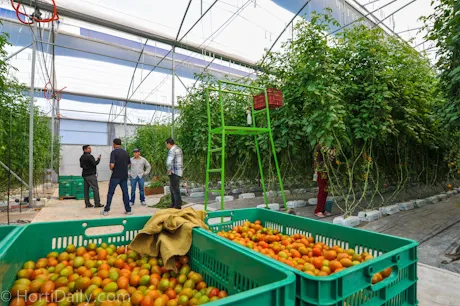
The team of Leyton Greenhouse Supplies and Shan Halamba from Riococo visit Salinas' greenhouse.
Despite the fact that they built a modern, medium tech greenhouse, the Salinas family decided to grow in the soil in the first place. "We have always grown in the soil and weren't familiar with the use of hydroponic substrates as rockwool or coco," said Miguel. "Many growers in Mexico cultivate in the soil in tunnel structures because they are used to this. In most cases this goes very well, but as the market is changing, soil cultivation is no longer a safe choice. Our customers need reliable cultivation methods as the margins get smaller. Nowadays, when soil borne diseases occur, you can lose your customer.
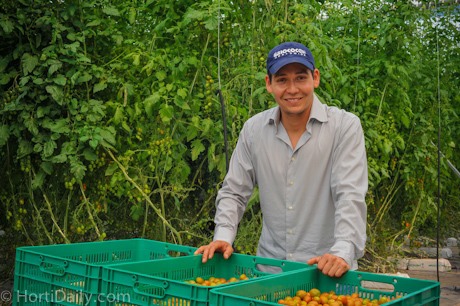
Grower Miguel Salinas.
Nematodes
That is exactly what happened in the greenhouse of Soluciones en Horticultura. "When we finished our new structure in 2012, we were immediately hit by many problems after we planted our first crop," explained Miguel. "Our crops were largely affected by nematodes. The plants lost their vitality and as a direct result a pest killed the rest of our plants. We were shocked and did not know what to do, my father was thinking about closing the entire business. Shortly after this, we got in touch with Edgar Leyton from Leyton Greenhouse Supplies, who's knowledge and consulting advice convinced us to start all of over again and implement hydroponics.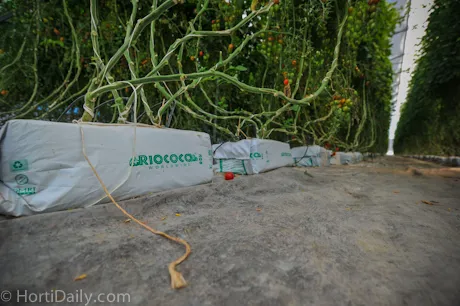
The Riococo growing bags. Salinas choosed for a smaller bag because he didn't want to take a risk when another disease would occur. "In case of a disease we would only have to remove a small bag with three plants instead of a large bag with six plants", said Salinas.
Salinas and his son removed the crop in February 2012. They disinfected the greenhouse and covered the soil inside the greenhouse with plastic film. "After we cleaned everything, Edgar Leyton advised us to start using Riococo growing bags. He did not only advise us in the size of the bags and the right mix, but also assisted us
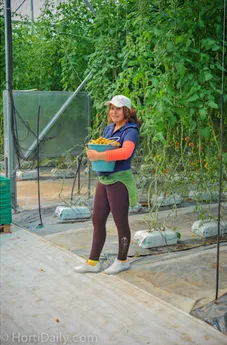 in the entire cultivation strategy. Since we needed to learn a lot of hydroponics it wasn't an easy start. We were not familiar with cocopeat, drip irrigation or recirculating. Thanks to Edgar we learned how to adapt the right irrigation strategy, and in combination with the Riococo bags we soon started to see good results."
in the entire cultivation strategy. Since we needed to learn a lot of hydroponics it wasn't an easy start. We were not familiar with cocopeat, drip irrigation or recirculating. Thanks to Edgar we learned how to adapt the right irrigation strategy, and in combination with the Riococo bags we soon started to see good results."Proud
"Looking back, changing to hydrponoics on Riococo growing slabs is one of the best choices we have ever made, said Miguel. "We always had many problems with the PH of our irrigation water (3.5), but thanks to the coco the PH is better regulated and the plants survive when we make a small mistake in our plans. The Riococo slabs are very forgiving, more then we expected. Since we started all of our plants survived and we even have much better yields than we had when we were growing in the soil. We are very pleased with the results, it is a pleasure to work in the greenhouse everyday and see such a strong crop. In the past we were always working against high tech growing in Mexico, The US and The Netherlands, but thanks to the cocoslabs we are now also able to grow a decent crop like them. It makes us really proud."
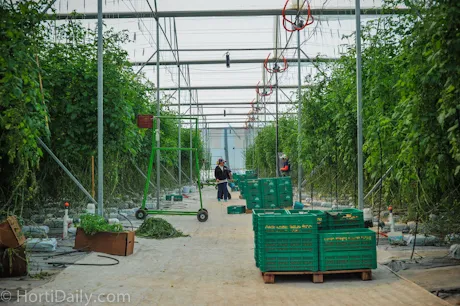
The greenhouse is made of double insulated polyfilm. Pollunation is done by hand because bumblebees are a large investment in Mexico and the labor is very cheap.
Challenge
Edgar Leyton was also very happy to see the first results: "It was a real challenge for me to transform these conventional growers into successful hydroponic producers. I visited the greenhouse more then once a week to advise them. I knew that we had to be successful in the first year, otherwise all of the effort would be for nothing, the first impression of the substrate had to be very good. As well as this, we also had to be successful because the company lost a lot of money when the first crop was eliminated."
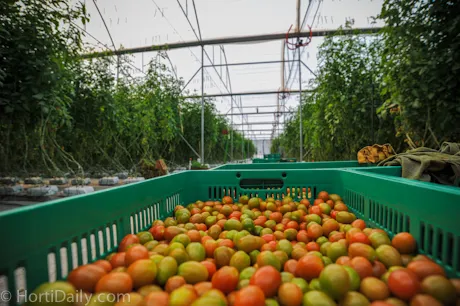
Freshly picked Sakata Amai.
"Despite the fact that growers did not have high tech climate control technique or irrigation computers, they achieved the same result as a high tech operation," Leyton stated proudly. "This is also appreciated by our clients," added Salinas, who is now cultivating Amai grape tomatoes from Sakata on Maxifort rootstocks from De Ruiter. The plants are sown, grafted and propagated by Planfort. Their produce is packed and shipped by a local marketer to various clients in the US and Mexico. "We harvest the same quality product throughout the season, our customer is very satisfied with this and we even make a better price nowadays."
 For more information on Riococo in Mexico please contact:
For more information on Riococo in Mexico please contact:Leyton Green House and Supply S de RL de CV
Ing. Edgar Leyton Luna (e-mail)
Av. Lazaro Cardenas del Rio 42-B
Rancho Seco, Celaya, Guanajuato, México.
Tel 461 618 2963
Cel 461 101 0472
www.leytongreenhouse.com.mx
 To learn more about Riococo growing bags, please visit www.riococo.com or send an e-mail to inquiries@riococo.com
To learn more about Riococo growing bags, please visit www.riococo.com or send an e-mail to inquiries@riococo.com